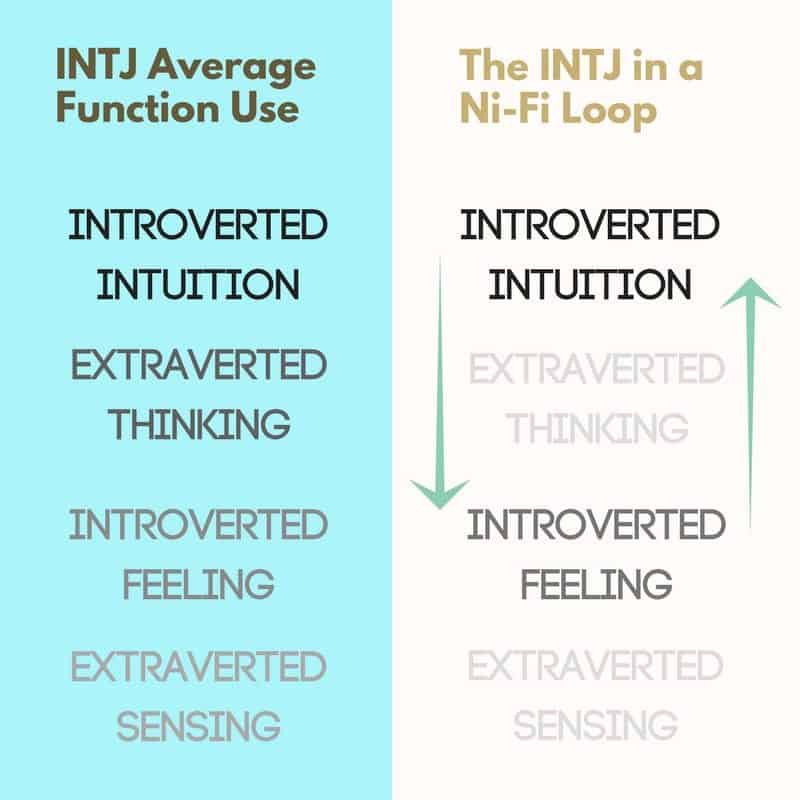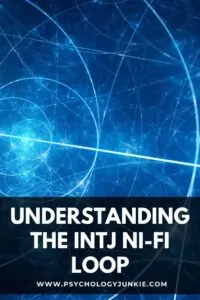The INTJ Ni-Fi Loop
Do you ever feel like there’s a part of you that doesn’t match type descriptions? A lot of INTJ descriptions make out the type to be very cold, aloof, and unfeeling. This can be surprising to many INTJs who actually feel very in touch with their feelings, values, and emotions.
INTJs are much more nuanced than most type descriptions would imply. Rather than being the cold-hearted rationals that most stereotypes paint them as, they are actually quite reflective, thoughtful, and even ethical.

In today’s article I want to explore a phenomena that happens to INTJs at times when they feel stressed or when they become unbalanced. INTJs going through a “loop” may not seem like your typical INTJ. They may also be struggling with a lot of confusion and frustration in their day to day life.
To understand the INTJ loop we need to look first at the INTJ cognitive function stack.
Not sure what your personality type is? Take our new personality questionnaire here. Or you can take the official MBTI® here.
Table of contents
Estimated reading time: 8 minutes

As you can see in the graphic above, an average INTJ will have a strong use of Introverted Intuition, followed by Extraverted Thinking, Introverted Feeling, and Extraverted Sensing. In the graphic, you can see that the influence of each function becomes lessened as you move down the function stack.
When an INTJ is looping, they have diminished use of their auxiliary thinking function. In fact, they bypass thinking and go straight to feeling. Then they loop back up to intuition, then back to feeling, over and over again. This is not a healthy state for the INTJ to be in and usually results in imbalanced decision-making, irrational fantasies, and loss of focus.
What is the Use of the Tertiary Function?
In most cases, the tertiary function aids the auxiliary function to ensure that decisions are being made with balance. Because the INTJ uses Extraverted Thinking (Te) as the auxiliary function, Introverted Feeling (Fi) balances Te and questions Te-motives and agendas. It ensures that the INTJ not only makes the most logical decision, but a decision that aligns with their personal values and morals. Fi gives the INTJ a determination to stay true to their own identity and individual moral code. INTJs who use Fi proficiently can take time to understand how their decisions affect not only themselves but the people around them.
Before we get into all the manifestations of the Ni-Fi loop, let’s figure out what Ni and Fi are.
Introverted Intuition (Ni)
Introverted intuition is an ability to understand how the world works through internal analysis, insight, abstract thought, and symbolism. Ni users have the ability to easily spot patterns and trends that will lead to a future outcome. They get strong hunches and “gut” feelings out of nowhere that are related to an unconscious synthesis of sensory data.
Introverted Feeling (Fi)
The ability to deeply understand one’s own emotions and values. Fi users have a strong moral compass and believe in being authentic and true to themselves and their identity.
Introverted Feeling in the INTJ
For the young INTJ, introverted feeling is often erratic and unpredictable. It’s not nearly as comfortable for them to use as intuition and thinking. They may repress negative emotions one day and then dwell on them the next. They may be hypersensitive to criticism one week and able to take criticism in stride another week. The tertiary function can at times be very proficient and at other times be very inept. Through life experience, maturity, and determination the INTJ normally develops more balanced use of the tertiary function in mid-life.
The Importance of Extraverted Thinking
Extraverted Thinking (Te) is what balances the INTJ’s dominant function, Introverted Intuition (Ni). Te takes all the insights, projections, and ideas of intuition and puts them into workable plans. Te is focused on objective logic, efficient decision-making, and putting plans out into the external world. Te works in tandem with Ni to make the INTJ strategic, planful, objective, organized, and decisive. When INTJs bypass Te they become lost in an unproductive state, withdrawn from the outer world and disinterested in making any difference in their environment.
Reasons INTJs Loop:
– As a defense mechanism.
The INTJ is defending themselves from the outer world and outer pressures by secluding themselves in their introverted functions.
– As a result of environmental imbalance
The INTJ has not been given sufficient opportunities to use the auxiliary function, and thus stays in a continual state of seclusion and focus on their introverted functions.
– The auxiliary function isn’t valued
If the INTJ favors the internal world to such an extensive degree that they don’t even try to develop their auxiliary function or get out into the world, they can loop.
What the INTJ Loop Looks Like
INTJs experiencing a Ni-Fi loop can get stuck in a world of theoretical visions compounded by subjective, emotional reactions. They are often called “conspiracy theorists” when this happens. They become suspicious of other people and the world at large. Fi feeds the INTJ emotion-based suspicious, and Ni will go to any lengths to justify those suspicions.
As an example, an INTJ in a loop could imagine that her friend doesn’t like her. Fi and Ni work together to make an emotional judgment that the friend dislikes her after the friend seems distracted and keeps excusing herself at a party. The same friend keeps canceling plans and showing up late to meetings with her. However, if Te and Se had been in the picture and functioning properly, Te would have been working with Ni, Fi and Se to see that
A) The friend’s distraction is a result of tiredness (the friend has morning sickness, is anxious about pregnancy)
B) The friend is canceling plans and showing up late because she’s feeling sick. Maybe friend needs some help or reassurance.
The above example may be kind of extreme, but it gets the point across. Fi feeds Ni feeling-based reactions and suspicions, and Ni fills in the gaps with any perceptions that might solidify those Fi-based suspicions. Ni doesn’t see the details (the friend has morning sickness, the friend has dark circles under her eyes, the friend isn’t eating normally). Ni just sees an impression (friend is gloomy, distracted, and mysteriously absent). Te and Se are left out in the cold and ignored and repressed so that Ni and Fi can continue feeding each other illogical fantasies and beliefs.
The Ni-Fi loop can also manifest when an INTJ comes up with rules or edicts that they enforce to everyone else. Their feeling-based values become “facts” and everyone must obey/adhere to them.
Other Ni-Fi loop traits: self-centeredness, insecurity, irrational behavior, preoccupation with a “vision” or idea of what is “really” happening, uncertainty, repeated grip stress reactions.
How INTJs Can Get Out of a Loop:
The first step to getting out of a loop is recognizing that you are actually experiencing a loop. This can be difficult initially because the dominant-tertiary loop can feel comfortable. It can seem natural because you’re still using two of your primary functions and in your preferred introverted direction.
Whatever you do, don’t go to Extraverted Sensing (Se) to solve the problem. Many INXJs do this, but switching to the inferior function can push you into the grip instead of a healthy functioning state. Going to Se to get out of a loop can cause you to become indulgent, impulsive, and overly focused on sensory experiences in an unhealthy way. To get out of a loop, your best option is to focus on your auxiliary Extraverted Thinking (Te).
Talk over your state with someone else and ask them if your projections make logical sense. Sometimes just saying your thoughts out loud (extraverting them) can help you to see what you might be missing or what logical missteps you’ve taken. Use Te to make a difference in the outer world. Structure and organize your day. Focus on attainable, logical goals and make a roadmap for how you will reach them. Play chess or another strategy game. Do things that force you to use logical, objective thought in an externalized way. Talk to people, work out plans, write out your plans, record yourself speaking through your ideas and visions and then listen to yourself and decide if what you’ve said makes sense. Just try to activate Te and re-introduce it into your daily life. As you do this you will start to get out of the loop and enjoy a more balanced, healthy, pro-active state.
What Are Your Thoughts?
Have you ever been in a loop? Do you have any suggestions for getting out of one? Let us know in the comments!
Find out more about your personality type in our eBooks, The INTJ – Understanding the Strategist, Discovering You: Unlocking the Power of Personality Type or The INFJ – Understanding the Mystic. You can also connect with me via Facebook, Instagram, or Twitter!
All About INTJs
Other Posts You Might Enjoy!
How You Use Extraverted Thinking – Based On Its Location in Your Function Stack
The Childhood Struggles of INTJs

Subscribe to Our Newsletter

Want to discover more about personality type? Get the inside scoop with Susan Storm on all things typological, along with special subscriber freebies, and discounts on new eBooks and courses! Join our newsletter today!














I’m a 17 year old INTJ student from India and I definitely am experiencing this loop right now! I’ve gotten into studying about the MBTI types (beneath the surface of just “INTJ-The architect” or “ESFP-the Performer” and I must say I’m a newbie to learning about the cognitive functions) and while I always have felt I use Te profusely, it has often been in an immature or impulsive manner and its been months since i havent gotten my daily to-do list done and it frustrates the heck outta me, to an extent I almost decided im an INTP since INTJ’s are usually the more focused and productive bunch (Sorry if that sounds aggresively stereotypical) and I can relate to a lot in this-having the “oh I don’t care about others’ opinions” attitude only to become the “who are you to think of me like that?” attitude, it definitely is an Fi-Ni loop and I’m so glad to have come across this article since I finally know areas I need to work on. I don’t know if I’ve bene able to get my condition across clearly, but all I need you to know is that you’ve given me significant info for me to build on for self-growth, thank you for this.
soo.. i can’t tell if i’m actually an intj since i don’t care about doing things to be productive. i’d rather sit and do mostly nothing, just think and fantasize about mbti and other stuff. i think that if i am any type within the 16 i might be intj because of how i’ve gone about finding my type, asking questions and looking into all types and their states.. as well as having watched the 5 signs you’re not an intj video. i just feel like the world doesn’t agree with me? but even that might be me looping. it’s gotten so bad that i got psychosis, thinking i could hear other people’s thought and they could hear mine. so much negativity.. are you able to tell when you’ve escaped the loop? i guess i would be able to but haven’t yet because i’m so ”comfortable” with my ni fi projections (if that is what it is). anyways here goes my comment
You could be INTP, then you’re inferior function would be Fe – Fe has the ability to “know” what other people are thinking. So I would suggest Googling Fe grip experience.
Best of luck, try do one productive thing a day, and u’ll survive 💪 😉
your comment section doesn’t work. just tried commenting and loading other comments. is this site fake
Comments just have to be approved by me because we had an issue with people bullying each other in the comments or posting spammy links 🙂 Sometimes it takes me a little while to get to the comments to approve them! Thanks for your patience!
I think healthy integration of the Fi is more useful than using Te yes of immediate purpose Te might be helpful but to completely annihilate this state I think Fi should be integrated I am more of a Jungian than I think an unhealthy Anima when possesed then the INTJ experiences this Ni Fi loop because the Anima has two functions one is to tune the hero’s purpose with internal moral values and to make the unconcious concious the last two functions are always one observing and another dicision making in INTJ the Fi decides and Se observes the Anima tunes INTJ to his internal moral values guided by his predominant unconcious instincts and she makes the unconcious concious through the observing inferior function Se that’s why it is very needed to integrate the last two functions as Se is the face turned towards the unconcious .
I am an INTJ, and am experiencing this loop, and don’t know how to get out of it, I tried to speak to many people, I tried to simulate my problem, and find its solution, also I tried to find the cause of the problem, but nothing worked.
So I am experiencing very hard time, don’t know how to solve it, like I am cornered, whatever I think about, I can’t get anywhere, just like a failure.
Please anyone, HELP!